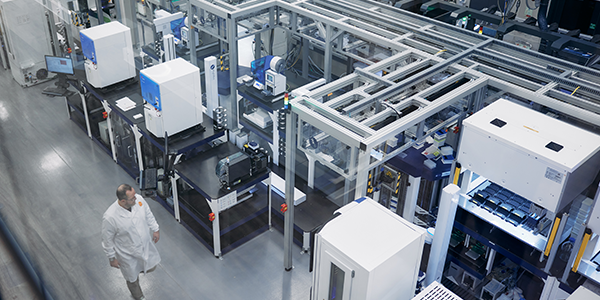Overview
Exscientia uses generative artificial intelligence (AI) throughout the design-make-test-learn (DMTL) cycle to discover new therapies for patients quickly and relatively inexpensively. Conventional drug discovery methods can take up to 15 years and cost over 2 billion dollars, with an average failure rate of 90–96 percent because scientists hunt for specific drug candidates among 1060 bioavailable small molecules.
Built on Amazon Web Services (AWS), Exscientia’s innovative DMTL solution incorporates in silico design—using generative AI algorithms to design compounds in the cloud—and automated robots that make drug candidates in a lab. “We use generative AI to solve for efficiency and effectiveness,” says David Hallett, Exscientia’s interim CEO and chief scientific officer. “By predicting the molecular features of a safe and effective drug in silico, we minimize the number of costly experiments. Our platform, built in collaboration with the AWS team, is optimized for speed. We can repeat many DMTL learning loops, improving our drug candidates with every iteration.”

About Exscientia
Exscientia is a technology-driven drug design and development company, committed to creating more effective medicines for patients, faster. Exscientia combines precision design with integrated experimentation, aiming to invent and develop the best possible drugs in the most efficient manner.
Using Generative AI for More Efficient Drug Discovery at Reduced Cost
Working backward from patient needs, Exscientia defines precise target product profiles (TPPs) that specify the complex combination of properties required by a well-tolerated and effective medicine. AI engineers design algorithms that generate panels of potential drug candidates to meet the TPPs. Active learning algorithms help expert designers to select a short list of drug candidates to synthesize in the lab, because they either move the TPPs forward or refine the models for future DMTL cycles.
Exscientia’s algorithms are trained on publicly available pharmacology data and proprietary in-house data generated from patient tissue samples, genomics, single-cell transcriptomics, and medical literature. By encoding data throughout the process and analyzing experimental results and previous design cycles, Exscientia can optimize upcoming design cycles and promote compound designs that are physically synthesizable.
Using this synthesis-aware, iterative approach built on AWS, Exscientia makes 10 times fewer compounds than the industry average. “The idea is to iron out chemical liabilities to make safer and more effective drug candidates before we ever test them in patients,” says Hallett.
Exscientia has accelerated drug design by up to 70 percent while decreasing capital cost by 80 percent, compared with industry benchmarks. Using generative AI with other tools, Exscientia not only developed better drug candidates faster but also identified the right drug combinations to trial with patients in the clinic.
Cutting Time and Costs Using Automated Robotics to Make Better Medicines
Exscientia has incorporated cutting-edge chemistry synthesis and biology assay lab equipment with automation robots to avoid manual handling of lab equipment. Thus, its lab—orchestrated by AWS microservices—can operate 24/7 with minimal human supervision, “When our designs are ready, we can push a button, and within a few days, the robots are making the drug,” says Hallett. Maintaining extremely high levels of security and comprehensive disaster recovery, Exscientia will use this automated robotic capability to reduce the make and test timelines resulting from traditional offshore research contracts used across the industry.
As the company closes the loop with its robotic automation lab, it expects further productivity improvements. Data generated in the lab improves algorithmic predictions and speeds up DMTL cycles.
Introducing AI-Designed Molecules into Clinical Trials
Six molecules that Exscientia designed using AI have entered clinical trials. “Using AWS, we reduce bottlenecks and accelerate the pipeline,” says Hallett. “By switching on this highly integrated and automated DMTL loop, we can make drug candidates faster and more cost-effective.”

Using AWS, we reduce bottlenecks and accelerate the pipeline.
David Hallett
Interim CEO and Chief Scientific Officer, ExscientiaDid you find what you were looking for today?
Let us know so we can improve the quality of the content on our pages